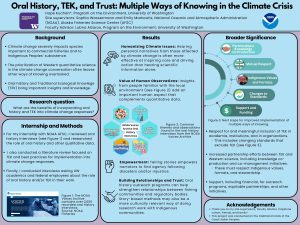Oral History, TEK, and Trust: Multiple Ways of Knowing in the Climate Crisis
There is an urgent need to utilize all forms of knowledge to create relevant solutions for those affected by climate change. Oral history, qualitative interviews, and Traditional Ecological Knowledge (TEK) can reveal important place-based observations about the environment from people who live and/or work in the area. However, these methods are often overlooked in favor of quantitative data. The purpose of this study was to learn about the best practices for incorporating oral history and TEK into climate change responses. Through my internship with the National Oceanic and Atmospheric Administration (NOAA) Alaska Fisheries Science Center (AFSC), I reviewed oral history interviews with fisherfolk collected by NOAA. I also created an annotated bibliography on the use of qualitative data in ecological research to learn about how narrative-based information from a human perspective can work alongside quantitative data, creating a fuller picture of ecosystem change. Additionally, I conducted a literature review and interviewed professionals about oral history and TEK. I found that oral history is an important tool for empowerment, relationship building, and trust. Personal stories can also humanize climate change issues and inspire action. Another finding is the importance of support for outreach, equitable collaboration/partnership initiatives, and co-production of knowledge. Changes at the institutional level should include facilitating respect for multiple ways of knowing, making changes to scientific standards to allow meaningful inclusion of TEK, and acknowledging the importance of relationships and reciprocity in the research process. Indigenous stewardship and expertise must also be respected and Indigenous-led climate response initiatives supported.
